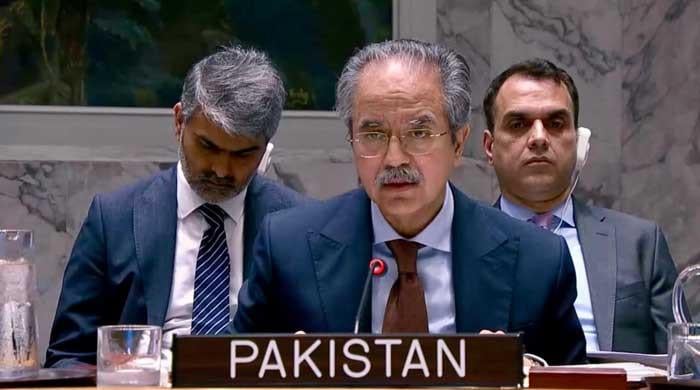Pakistan Urges UNSC Intervention in Iran-Israel Conflict
Pakistan has implored the United Nations Security Council (UNSC) to urgently step in and facilitate a peaceful resolution to the escalating conflict between Iran and Israel.
Ambassador Asim Iftikhar Ahmad, Pakistan’s permanent representative to the UN, addressed the council, emphasizing the critical nature of the situation. He urged the Council to uphold its responsibility by fostering dialogue and diplomacy, adhering to the UN Charter to avert further regional destabilization.
The emergency session was initiated by Guyana, the Council’s president for June, with backing from Pakistan and others, amidst the ongoing hostilities between Iran and Israel.
Reports indicate that Israel has launched extensive strikes on Iran, targeting military installations, nuclear facilities, and residential zones across the nation since Friday.
These attacks have reportedly resulted in at least 224 fatalities in Iran, encompassing high-ranking military officials, nuclear scientists, and civilians. In response, Iran launched drone and missile attacks, causing at least 25 deaths in Israel, according to local authorities.
Iran does not recognize Israel and has long alleged that Israel has conducted covert operations targeting its nuclear sites, including assassinations of its scientists.
Ambassador Asim conveyed that the ongoing Israeli strikes against Iranian nuclear facilities and other targets have intensified regional tensions and posed a threat to peace and security.
“Dialogue and diplomacy, conducted in strict compliance with international law and the UN Charter, remain the sole viable approach to resolving the crisis,” he stated, asserting that military force and coercion would not lead to a lasting resolution.
He regretted that these Israeli strikes occurred during a period of intense diplomatic engagement regarding Iran’s nuclear program, highlighting the necessity to prevent these actions from disrupting dialogue.
“Parties must swiftly return to negotiations, the only feasible means to achieve a sustainable agreement on the Iranian nuclear program,” the Pakistani envoy stated, acknowledging the United States’ willingness to maintain open channels for negotiation.
“We hope that these diplomatic efforts and engagements will prove fruitful.”
The Pakistani envoy began by condemning the Israeli strikes initiated on June 13, asserting that they infringed upon Iran’s sovereignty and territorial integrity. “Pakistan firmly condemns this unjustified and illegitimate aggression by Israel. We stand in solidarity with the people of Iran,” he affirmed.
“We extend our sincere condolences and sympathies to the people of Iran for the loss of life resulting from these unprovoked attacks,” he expressed, adding that the resulting humanitarian and civilian impact is “deplorable.”
“The current crisis has heightened existing regional tensions stemming from Israel’s relentless assault on Gaza, creating an unprecedented humanitarian catastrophe for innocent Palestinians, and its recurrent violations of international law in Syria, Lebanon, and Yemen,” he added.
He also noted that attacks targeting nuclear facilities intended for peaceful purposes contravene international law, the UN charter, the IAEA statute, and relevant IAEA General Conference resolutions.
During the debate, Ambassador Iftikhar urged the Council to unequivocally condemn Israel’s attacks on Iran since June 13, to actively work to halt hostilities and promote de-escalation for a comprehensive ceasefire before the situation spirals out of control, to clearly condemn the targeting of IAEA-safeguarded nuclear facilities, and to advocate for dialogue and diplomacy to foster a peaceful resolution.
“Diplomacy must be given a chance,” Ambassador Iftikhar concluded.
UN Secretary-General Antonio Guterres inaugurated the debate with a warning that the expanding conflict between Iran and Israel could “ignite a fire no one can control,” urging both sides and potential participants to “give peace a chance.”
Representatives from Israel and Iran exchanged sharp accusations during the same UN Security Council meeting, with Israel pledging to continue its attacks.
The head of the UN nuclear watchdog agency cautioned that attacks on nuclear facilities could lead to “radioactive releases with significant consequences within and beyond boundaries,” calling for utmost restraint.
Guterres stated that the current decisions “will shape not just the fate of nations, but potentially our collective future.” He reiterated that the conflict must not be allowed to spread.
“To the parties to the conflict, the potential parties to the conflict, and to the Security Council as the representative of the international community, I have a simple and clear message: give peace a chance,” Guterres stated.
The Security Council session coincided with a meeting of European foreign ministers and their Iranian counterpart, aimed at assessing Tehran’s willingness to negotiate a new nuclear agreement, despite limited prospects of Israel ceasing its attacks.
Israel has consistently targeted nuclear sites in Iran, viewing them as components of a weapons program, while Iran has launched missiles and drones at Israel, marking a week-long escalation with no clear resolution in sight.
The White House announced that US President Donald Trump would decide within two weeks whether to intervene on Israel’s behalf.
Iran maintains that its nuclear program is exclusively for peaceful applications. On Friday, it declared it would not discuss the program’s future while under attack by Israel, which is widely believed to possess nuclear weapons, though Israel neither confirms nor denies this.
Iran’s UN Ambassador Amir Saeid Iravani asserted Iran’s right to defend itself against Israeli attacks, while his Israeli counterpart Danny Danon vowed, “We will not stop. Not until Iran’s nuclear threat is dismantled, not until its war machine is disarmed, not until our people and yours are safe.”
US ambassador to the United Nations, Dorothy Camille Shea, stated that the United States “continues to stand with Israel and supports its actions against Iran’s nuclear ambitions,” adding, “We can no longer ignore that Iran has all that it needs to achieve a nuclear weapon.”
China and Russia called for immediate de-escalation.
Russia’s UN ambassador, Vasily Nebenzya, warned that Israel’s actions risked drawing in third countries, emphasizing the need to avoid internationalizing the conflict.
He cautioned that targeting what he described as Iran’s peaceful civilian nuclear facilities could “plunge us into a hitherto unseen nuclear catastrophe.”



Comments (0)
No comments yet. Be the first to comment!
Leave a Comment